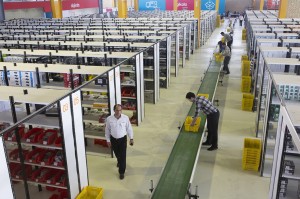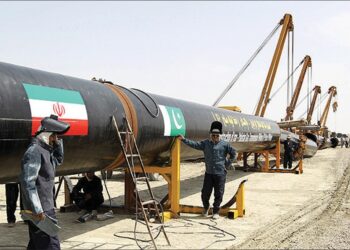
November 14-2014
Persian version of Amazon, stages its deliveries. Sanctions are hurting Iran, without a doubt. The regime, however, insists they are good for Iran because they make it more self-reliant.
While that is clearly a self-serving comment, it is not totally baseless. One case where regime rhetoric becomes reality is in the realm of computer commercial technology firms—the “start-ups” that everyone talks about in the United States.
Amazon dominates in the United States and is even more dominant in retailing in some other countries. But under US sanctions, it has no presence in Iran. That has opened the doors for Digikala, an Iranian start-up that is filling a retail void Amazon cannot touch.
Groupon is another American firm with an idea—allowing restaurants and shops to offer introductory deals to draw in new customers—that has taken off like a rocket in the United States. But it can’t do anything in Iran. That has opened the door for Takhfifan to make the Iranian market its own without outside competition.
The classic criticism of this kind of arrangement is that firms cloaked behind the wall of sanctions—or, more commonly, protective tariffs—may actually rip-off their customers precisely because there is no competition to

force them to restrain their profit-making urge. And many start-ups in Iran are indeed reporting huge profits.
The Washington Post this week looked at the start-up scene in Iran. It barely touched the profit issue, but was mightily impressed by what young Iranian entrepreneurs are doing behind the protective wall of sanctions. Sanctions, the Post concludes, “are both a gift and a curse.”
The Post talked to Hessam Armandehi, 28, who left Iran to pursue a career in Europe. But after graduate school in Sweden, he thought it over and decided to head back to Iran.
“If I came back to Iran, I would lose everything that I could do outside Iran — reservation via Airbnb, working on Android Market. I was losing everything and still I was not that unhappy with it. I felt that we can create everything inside Iran ourselves,” Armandehi said.
Because Google’s app store for Android wasn’t initially available in Iran, it opened a door in 2010 for Armandehi to co-found Cafe Bazaar, which is essentially an Android app store for Iranians. It had 100,000 users within three months, and now has 10,000 local apps available from more than 2,000 developers. According to World Startup Report, it’s worth $20 million.
Then there are twin brothers Hamid and Saeed Moham-madi, 35, who founded Digikala, a Persian version of Amazon’s electronic shopping.
The brothers used $20,000 in savings to start their business. They borrowed office space from their brother, who didn’t charge them rent for their first year.
Today, Digikala receives 3,000 orders a day. The World Start-Up Fund says it is worth $150 million and is Iran’s top start-up. The Mohammadis think the $150 million valuation should be even higher as they expect $100 million to $150 million in revenue this year.
Digikala has 450 employees and expects to have 700 in five months. It will have distribution centers in 16 cities in two months, and will offer next-day delivery in those cities. All deliveries are made by Digikala employees—so Digikala is sort of a merger of Amazon and United Parcel Service.
The company was profitable from the very start, something unheard of in the United States. But this year Digikala is focused on growth. Profits can take a backseat as Digikala ramps up around Iran. The Post said that’s possible only because of venture capital, which until recently was unheard of in Iran. Although the brothers plan to focus on Iran for now, they are considering growing to Afghanistan, Turkmenistan and Iraq.
Other start-ups include Zoosk, which—if you can believe it—is a dating service. In the Islamic Republic?!?!
Women aren’t left out of the boom. There’s Nazanin Danesh-var, 30, who started Takhfifan, a variant on America’s Groupon. She told the Post the change in the business climate has only occurred in the last two years.
“When I came to Iran, no one even knew the word start-up,” said Daneshvar, who returned to Iran three years ago after working in Germany.
Daneshvar’s profitable business is essentially a Groupon clone. Her site has more than one million e-mail subscribers and offers 25 deals per day. One especially successful deal sold 20,000 tickets to a movie.
Said Rahmani, who founded Tehran’s first venture capital firm, Sarava, told the Post, “If you look at the use of the words like entrepreneurship, start-ups and venture capital, I think you will see a trend. There was absolutely a minimum—nothing—mentioned in Iran [until] two years [ago]. Now you can talk about venture capital, VCs. It’s become a fashion.”
Rahmani was born in Iran but left as a teenager for the United States. He worked for IBM and launched a start-up in upstate New York. Later as an employee of Internet company Naspers, he was asked to evaluate the possibility of investing in Iranian start-ups. Ultimately, Naspers decided not to invest, but Rahmani was convinced of the country’s potential and returned home.
He and others point to the combination of a young, educated population, the proliferation of smartphones and increasing Internet speeds as fertile landscape for start-ups.
There are other signs, too. Iran Web Festival, launched in 2008 to recognize the country’s best websites, started with just 100 applicants. This year, 8,000 websites entered.
No one pretends that the impact of sanctions on these businesses is all positive. There are downsides. “If you’re looking for a technology, if you’re looking for a device, if you want to buy a server, if you really need investment from other countries, yes, in these parts sanctions are very bad,” said Shayan Shalileh, who started Iran Web Festival.


















